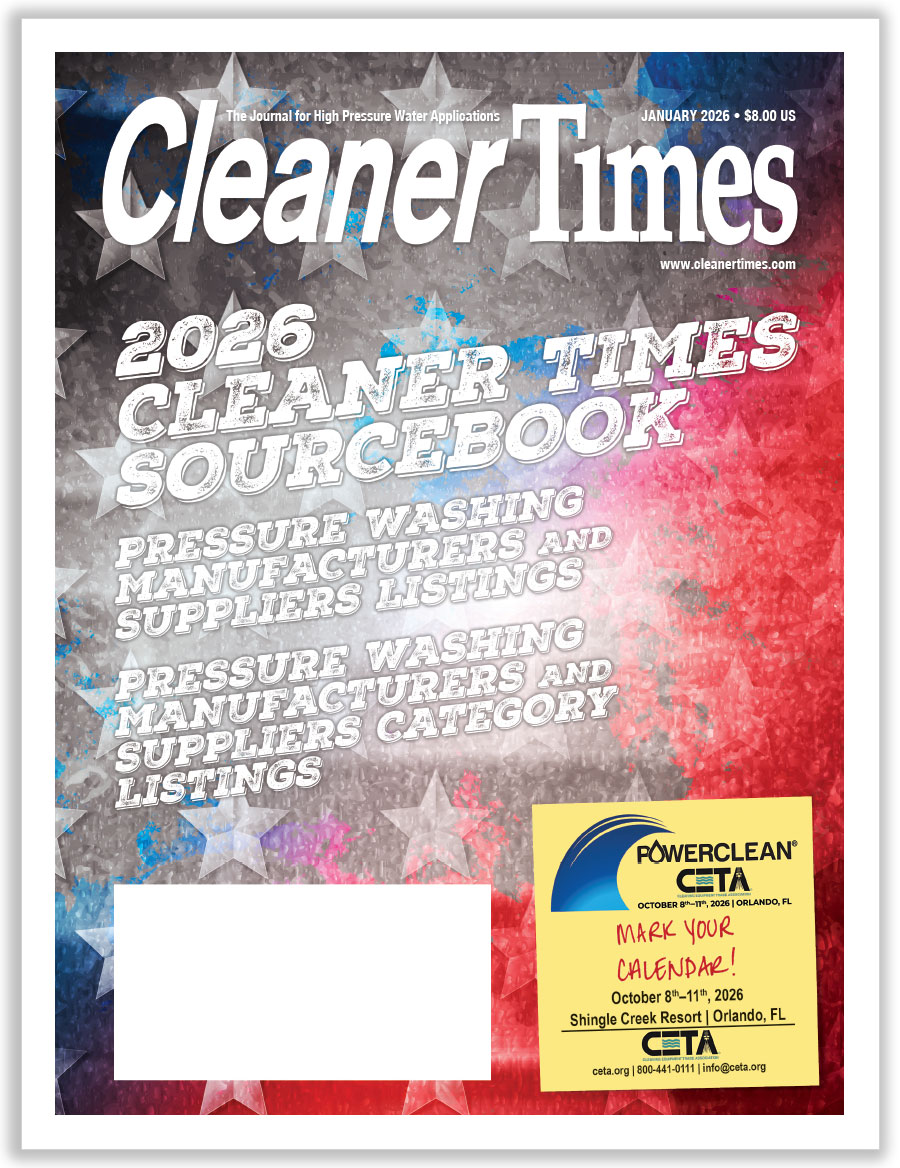
Utility of AI in the Pressure Washer Industry
by Diane M. Calabrese / Published September 2023

Algorithmic independence—artificial intelligence gone generative—seems to cause much worry of late. But artificial intelligence (AI) has been giving assistance to humans for decades (e.g., think autopilot). The capabilities of AI continue to multiply.
Quandaries about the role of AI abound. However, are they any different from the dilemmas that arise because among us there are (and always have been) individuals who will use their intellect (perception and understanding) for something other than good?
No one who enters the digital world can claim to be a stranger to AI. Every search engine relies on a foundation of data built on the searches of others and the probabilities derived from the data about what the next search will be for one. Online marketers rely on the same sort of predictive models to sell visitors more than they sought.
For now, AI does not so much know the human mind of individuals as it can predict the probability of the next decision the mind will make. (Excellent bridge, poker, and chess players are just some of those who run the human version of AI in their brains.)
Whether our readers look at AI with a sense of wonder, worry, or indifference, we thought it would be useful to get some perspective from industry members about the utility of AI in the pressure washer industry.
Yujin Yoo Anderson, general manager at Steamericas in Gardena, CA, gives us just a few of many examples where AI already provides significant assistance to members of our industry. She begins with enterprise resource planning (ERP).
“Our ERP uses AI to forecast the right amount to order using the recent movement history, lead time history, and sales pipeline,” says Anderson. “However, it is critical that you put in good data and update the data you put in.
“For example, if your sales projection is not up to date or is underestimated or overestimated, there is no way AI can forecast order volume correctly,” continues Anderson. That’s a critical observation.
Those steeped in the history of the computational algorithms that ignited the computer industry always recall the well-known joke about “garbage in, garbage out.” One can analyze, retrieve, or forecast with incorrect data, but the result will be useless.
The film The Desk Set (1957) introduced a computer to a research department. The film is noteworthy because it demonstrates that worries about human displacement are not new. Again, the retrieval of information—whether a forecast or a strict tally—can only be as good as the data entered. (Yes, the film is so old it has the predictable scene with the computer going rogue and punch cards—the way data was entered—being spewed everywhere.)
Will we arrive at a point where digitization of everything makes it possible to gather inventory, account, and order data instantaneously and use them for forecasting? Well, many supply chain programs already do much of that. But currently the variables in the way clients order have caused some users of the tools to avoid them for now. It’s all still a work in progress.
Anderson says that AI has the same utility in the pressure washer industry that it has in all businesses. She points to AI tools that can be used to summarize action items and names Otter as an example.
“Perplexity is a good research assistance tool when you have a particular question,” says Anderson. “For instance, I recently used it to answer a rather black and white HR question for an employee.”
Among the most well-known tools, Anderson cites Chat GPT [generative pre-trained transformers]. “It’s great for checking grammar, making a letter template, etc.”
Then, there are tools that “create visuals per your command,” says Anderson. Among them are Midjourney, Tome, and Serendipity.
Audio also benefits from AI. “ElevenLabs helps you get professional voice recording quickly without having to find a voice talent for your business phone directory greetings, for example,” says Anderson.
Anderson amplifies the caution about AI. “For AI to do its best, you have to feed it with good data and give constant feedback. Trash in, trash out. You have to be specific with your commands to get results that are usable.”
And time savings and AI are not always perfectly correlated in a positive way. “If you are using a chatbot AI on your website, for example, it takes some time for it to save your work,” explains Anderson.
As for an assessment about the utility of AI, Anderson combines pragmatism and philosophy. “The best-use case for AI is to save you from busy work, but not your brain work and creativity.”
Boost To The Basics
Ubiquitous is probably the best descriptor of the utility of AI in the pressure washer industry. So useful is AI that it gets taken for granted now in adding precision and accuracy to manufacturing processes, as well as confirming the integrity of raw material and components.
Josh Wagner, retail manager at Atlantic Pressure Washers in Linthicum Heights, MD, suggests that we not forget how much AI helps members of the industry with the day-to-day business operations while at the same time embracing all the potential in manufacturing and beyond.
“So many of our local customers fall under the owner-operator category,” says Wagner. “Everyone in that position will tell you it is difficult to keep up with the daily tasks of running a business.”
Wagner iterates the challenge. “Between paperwork—billing and scheduling, answering phone calls from potential customers, physically performing a service for those customers, and genuinely just performing that service—it’s a lot to do every day.”
Enter AI. “So many smaller businesses fail because they can’t balance day-to-day tasks properly, or they struggle to scale just from this concept,” says Wanger. “AI-based technologies have the potential to change all that.”
For example? “In theory, you could have AI answering phone calls, scheduling appointments, invoicing customers, and possibly even completing basic paperwork for a smaller business,” says Wagner.
“An example of a very basic task that comes to mind is simply optimizing your business’s website utilizing AI tech,” says Wagner. “Optimizing your website in turn optimizes your SEO [search-engine optimization], which then puts you on top of other businesses in your area, thus generating more calls to your phone.”
(It’s easy enough for a business to get a good idea of how it’s doing in the search-engine return sphere. Just use a few different search engines to search for the business. No or low return of the business name signals a need to optimize SEO.)
“AI tech then answers the call, answers basic inquiries about the business processes for your service, and sets you up with either an appointment for an estimate or books on the spot if your estimates can be generated based on public data,” explains Wagner. “You as the owner-operator then perform the work on the customer’s property and take before and after photos.”
The sort of AI program Wagner cites can be a true timesaver for small companies. It cuts hours from management because scheduling and completion of job are “handled” by the “tech.”
“The AI tech then collects the data, confirms with you the job is complete, and bills the customer accordingly,” explains Wagner. “Those photos then replace other photos or get added back to your website and the cycle restarts, continuing to push you ahead of your competition.”
Far from posing any threat, AI allows more people to do more of what they love, and Wagner puts that in the context of our industry.
“In almost all cases owner-operators will navigate their business based on a passion they have for the service performed,” says Wagner. “If that wasn’t the case, they would be in another industry or working for someone else.”
What’s Wagner’s status assessment? “Eliminating the mundane tasks and focusing on the core services your company offers has the potential to truly change the way businesses are run. The technology may not entirely be there yet, but it’s moving in the right direction for it.”
Promise or Peril?
AI, for all its promise—allowing everyone to do more, learn more, and benefit as a whole—attracts a large amount of negative attention. Some of it may be political; it’s difficult not to notice congressional members raising alarms. Some of it may result from the predictions of science fiction writers that date back more than a century.
The focus on peril, though, seems to come from those who overlook the vagaries of human actions. Intellect does not guarantee that humans always act for good. AI will likely follow suit, given it is the product of the human mind.
Peril derives not from the AI itself, but from a trajectory along which too many people stop striving to reach their full potential. The latter is a concern, but one that exists independently from algorithms so sophisticated that they begin to go independent and rewrite themselves. Humans should see staying a step ahead and doing one better as a challenge and a necessity.






